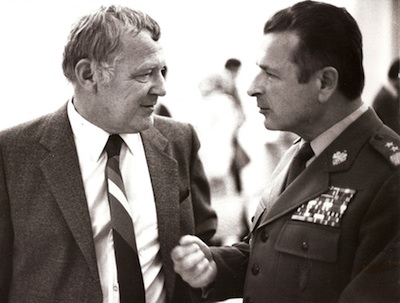 Poland
Poland
By Michał Przeperski
During a six-week visit to Stanford, I had the opportunity to become acquainted with some of the Polish collections in the Hoover Archives. The papers of Mieczysław F. Rakowski, the communist politician whose archival legacy is not well known to historians, made a big impression on me. Thanks to partial support from the Hoover Institution Library and Archives, I was one of the first historians to research this collection, which will enable me to complete my work on a political biography of Rakowski, the subject of my doctoral dissertation.
 Poland
Poland
Mieczysław Rakowski was a most interesting political figure in the Polish People’s Republic, best know as the last first secretary of the Polish United Workers’ Party and the second-to-last premier of communist Poland. His political career closely overlapped that of People’s Poland, making him an interesting example of the political and social processes taking place in the country after 1945. This includes building and consolidating communist power in Poland, its mature existence, and finally its disintegration in the 1980s.
One fascinating aspect of Rakowski’s biography is his ability to create his own image. Despite for many years being the editor in chief of the influential weekly Polityka and a high-level party functionary, he created his image as an “oppositionist from inside” the communist system. He accomplished this in large measure thanks to his ten-volume Political Diaries published in Poland during 1998–2005. In the entries he prepared for publication, he frequently presented views critical of the situation in the People’s Republic and of the cast of responsible characters.
This question was frequently asked in Poland: to what extent can Rakowski’s diaries be trusted? My research in the Hoover Library and Archives has provided an answer to this question. Weeks at Stanford reading the original (unedited) version of the diaries made it possible to establish the scale of additions made by Rakowski during the editing process, frequently giving a new meaning to past events. Because the Political Diaries are the most frequently quoted source for the history of communist Poland, they are significant. Though the importance of this source should not be dismissed, it is now necessary to look at it completely differently.
The Rakowski papers also include sources for the history of Polish journalism and politics, making it possible to trace the evolution not only of the man, but also the broader political and social changes. Thanks to these sources, we can reconstruct the efforts to fight for independence within the system, which made no allowance for independent space; we can also reconstruct the mechanism of conformity, a crucial element of the functioning communist regime, not only in Poland but in all the countries of the Soviet Bloc.
My six weeks at Stanford were productive; without them, completing my doctorate would not be possible. I want to take this opportunity to thank all of the Hoover Library and Archives staff members who helped me conduct my research. I am grateful for the support and friendly assistance I received. I hope that I will have an opportunity to return to the Hoover Institution in the future.



















